Archive for the "V-Day" Category
Posted — Filed under
V-Day
Tagged — No Comments
By Gil Kaufman (MTV)
Late last year, Mount Holyoke College in South Hadley, Massachusetts, redefined the admissions policy for the traditionally all-female school to include any academically qualified students — regardless of their anatomy or gender identity.
The only caveat was that prospective attendees could not be biologically male and still identify as male if they wanted to enroll. The move was applauded as a welcoming and inclusive gesture by transgender students on campus, some of whom became trans men while enrolled at the school.
But what do you do when the time rolls around for your annual production of Eve Ensler’s “The Vagina Monologues” (pictured, above) in support of the Valentine’s Day-pegged V-Day campaign to end violence against women and girls? What if some of your students feel like the play marginalizes them?
In Mount Holyoke’s case, you retire the “Monologues” and replace it with a home-brewed version that will be more trans-inclusive, according to Campus Reform.
“At it’s core, the show offers an extremely narrow perspective on what it means to be a woman. … Gender is a wide and varied experience, one that cannot simply be reduced to biological or anatomical distinctions, and many of us who have participated in the show have grown increasingly uncomfortable presenting material that is inherently reductionist and exclusive,” read a school-wide email drafted by the Mount Holyoke Project Theater board’s Erin Murphy, and obtained by Reform.
Murphy added that the replacement performance — comprised of student monologues delivered in a similar fashion as the original — will fix the “problems” that the Theater board believes are inherent in Ensler’s widely performed 1996 play, including what Murphy described as issues regarding its handling of race, class and “other identities.” Ensler’s stage work was intended to celebrate women’s sexuality.
Not everyone was on board with the decision.
Ensler and a spokesperson for Mount Holyoke could not be reached for comment at press time.
According to Campus Reform, some students took to the school’s Holyoke Confessional message board (open only to students and former students), to weigh in on the change. “I love how people who have never been able to discuss or embrace their vaj-wahs aren’t going to find an avenue here, either, since female-validating talk about vaginas is now forbidden. That’s so misogynistic under the guise of ‘progress,'” one wrote.
Another added, “But we can’t present a show that is blatantly transphobic and treats race and homosexuality questionably, when one of the conditions of getting the rights to the show is that you can’t critique it or alter it.”
Back in February of last year, Ensler spoke at the university about her battle with cancer in what the school newspaper described as an address, “tinged with humor, passion and often pain, her words came out of her own experience but were essentially a testament to the transformative, universal power of love and hope.”
Posted — Filed under
V-Day
Tagged — No Comments
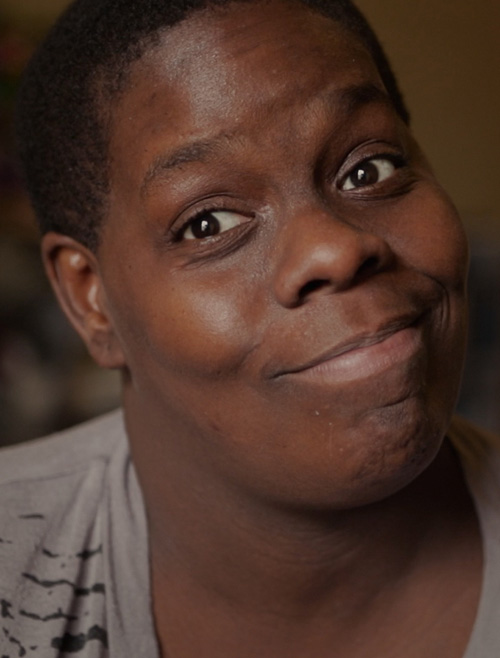 If you saw me in the street, you might recognize me, but I guess you wouldn’t know where from. I’m the person who served up your Happy Meal in McDonald’s. A few years later, I waited on your table at Red Lobster. A few years after that, I brought over your barbeque ribs at Dallas BBQ. Whenever I talk to customers like you, I smile as big as I can, and I say that I hope you have a nice day. I mean it too. But I figure I am writing this to tell you something I wouldn’t tell you over the counter. I want to tell you what life is like for people like me right now – because I am not having a nice day, and if I’m honest, I haven’t been for a really long time now.
If you saw me in the street, you might recognize me, but I guess you wouldn’t know where from. I’m the person who served up your Happy Meal in McDonald’s. A few years later, I waited on your table at Red Lobster. A few years after that, I brought over your barbeque ribs at Dallas BBQ. Whenever I talk to customers like you, I smile as big as I can, and I say that I hope you have a nice day. I mean it too. But I figure I am writing this to tell you something I wouldn’t tell you over the counter. I want to tell you what life is like for people like me right now – because I am not having a nice day, and if I’m honest, I haven’t been for a really long time now.
When I first became a waitress at the age of 17 in a pizzeria on Long Island, I loved it – I loved serving, I loved being with people, I loved food. I earned the minimum wage then. Now, twenty years later, I still live on the minimum wage. Today, that’s $5 an hour. That makes $1200 a month. I want to tell you what the bills are to keep myself and my three kids from becoming homeless – because that’s what I think about all the time, including when I bring you your food, no matter how big my smile might seem.
My rent is $1200 a month. My babysitting (so I can go to work) is $200 a month. Our food is $400 a month. The lights and water are $150. The phone is $60. The laundry is $60. The transportation is $130.
Can you add that up? I have never been able to. It’s hard to love your job when it doesn’t let you live. I am in debt all the time. The last few places I’ve worked, tips on top of the $5 subminimum wage* I get paid, have pushed me over into being able to survive, most months – but not all. I sometimes have the electricity cut off. The lights go dead; everything in the refrigerator goes bad. I have never had a vacation – not since I started this work at 17. I never have any time off – not for twenty years. I went into labor with my son on a shift at Red Lobster, because I couldn’t afford to take any time off. I was back at work almost as soon as he was born. My mom – who was a dental assistant – has to buy us sneakers or clothes when ours are no use any more. If it wasn’t for her… I don’t want to think about what have happened if it wasn’t for her.
I always know I am one accident, one slip-up, from it all falling apart. And at work, a lot of the time, I am treated like dirt. The management keeps you insecure – any mistake and they tell you that you could be out of a job at any second. Oftentimes I would be pressured to stay after the end of my shift and keep working, even though I had to get my kids from school. I have seen co-workers just fall apart – not be able to make ends meet, and end up homeless. People are afraid to speak out, because you can be fired and lose the last life-line you have.
But these days, as I serve your food, I am also thinking about something else – something better. A few years ago, I was pretty down. I know you have to work hard in life to get what you want, and I have always worked hard. My kids learned to never ask for much, because I got nothing. I was constantly upset, constantly stressed – when I’ve only ever done the right thing and work as hard as I can. When I hear politicians like Paul Ryan and Marco Rubio bragging that they, or their parents, did jobs like mine, I think – if you have been where I am now, how come you haven’t got a heart to help us?
And then I heard about an alternative. I heard there was a group called Restaurant Opportunities Centers (ROC) United here in New York – I live in Harlem – who were organizing to fight for the right to fair pay, paid sick leave, and for people who work in my kind of jobs to have other basic protections.
You shouldn’t have to go to work if you are ill, they explained – it’s bad for you and bad for the customers. We organized and fought. It’s not easy, when you work as hard as I do, to find that time and energy. But we did it – and we won. In New York State, we have paid sick leave now. You’ll never see me sniveling over your lobster ever again.
Now we are fighting for something even more important – one fair wage. We’re not asking for gold. We’re not asking for diamonds. We’re asking to get paid enough to support our families. The US is the only country that forces workers to live off tips. If you get tips at work, New York’s restaurants can pay you just $5 an hour. And New York’s full minimum wage is just $8, far lower than the rates in other countries. For me, a fair minimum wage means I’ll be able to buy clothes for my kids. It means I won’t be constantly terrified of being cut off from power. It means I can depend on a regular paycheck each week, and not have to hustle shift-to-shift for tips, putting up with advances from customers that think their tips gives them the right to hit on me, and get away with groping and eyeballing me. One Fair Wage means I will get paid fairly for a job well-done.
Maybe you’ve seen folks like me, we’ve been protesting at headquarters of the some of the biggest restaurant brands in the world, we’ve been outside fast food restaurants all over the US. We’re handing out leaflets, asking for your support. Nobody who works this hard should be this poor. Nobody who is struggling this much should feel this lost.
The fight for fair wages is spreading all over country – and if I win, you win. I see in Manhattan where all the money has been flowing – I see the fancy towers and the people going into them. I think some of that money – just a little – should start flowing back towards people like me and most likely you, ordinary Americans doing our best and working hard.
Thank you to everyone who comes up to us when we protest, to say you’re on our side. In the months of doing this, we have never once had anyone say anything mean, or negative, or downbeat. We know America is on our side. We won the fight for sick pay, and I believe we are going to win one fair wage. I think people all over the country need to stand up, like we’re standing up.
I believe we are going to win – and I can’t think about the alternative now, because I got to tell you, I can’t face another thirty years of living the way I have for the last twenty. I can’t face the lights going out one more time. I am trying to turn on a light. I got a lot of people standing with me. Please – join us.
As told to the One Billion Rising team.
You can join the fight for One Fair Wage at www.rocunited.org. They are working in alliance with One Billion Rising, which can be joined at www.onebillionrising.org
* The minimum wage for tipped workers in New York State is $5 an hour; these workers, 70% female, were frozen out of the New York State minimum wage increase this past year. The federal minimum wage for tipped workers has been frozen at $2.13 an hour for the last 23 years, and is between $2.13 and $5 an hour in 43 states nationwide.
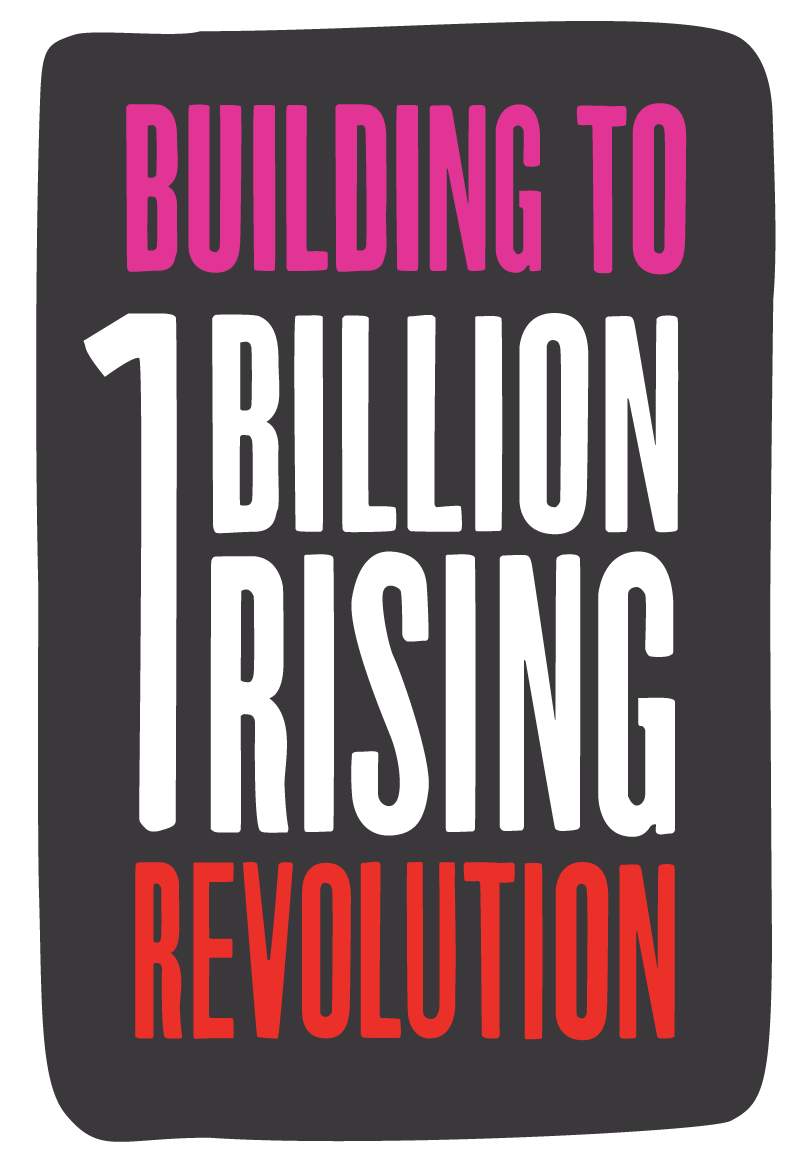 1 in 3 women across the planet will be beaten or raped during her lifetime. That’s ONE BILLION WOMEN AND GIRLS. Every February, we rise — in hundreds of countries across the world — to show our local communities and the world what one billion looks like and shine a light on the rampant impunity and injustice that survivors most often face. We rise through dance to express joy and community and and celebrate the fact that we have not been defeated by this violence. We rise to show we are determined to create a new kind of consciousness — one where violence will be resisted until it is unthinkable.
1 in 3 women across the planet will be beaten or raped during her lifetime. That’s ONE BILLION WOMEN AND GIRLS. Every February, we rise — in hundreds of countries across the world — to show our local communities and the world what one billion looks like and shine a light on the rampant impunity and injustice that survivors most often face. We rise through dance to express joy and community and and celebrate the fact that we have not been defeated by this violence. We rise to show we are determined to create a new kind of consciousness — one where violence will be resisted until it is unthinkable.
This year we are rising for Revolution. We are initiating a new series, “Building to One Billion Rising Revolution,” where we will be sharing stories of extraordinary activists who embody the creative radical shift in consciousness required to bring about CHANGE.
Grassroots activists who fight for justice and liberation with passion and joy.
Send us your stories. Stories change everything.
V-Day assumes no liability for any statements made by you on this page or that you otherwise submit to V-Day. Please remember that your post is public. Do not post real names, including your own, in association with your story.
Posted — Filed under
V-Day
Tagged — No Comments
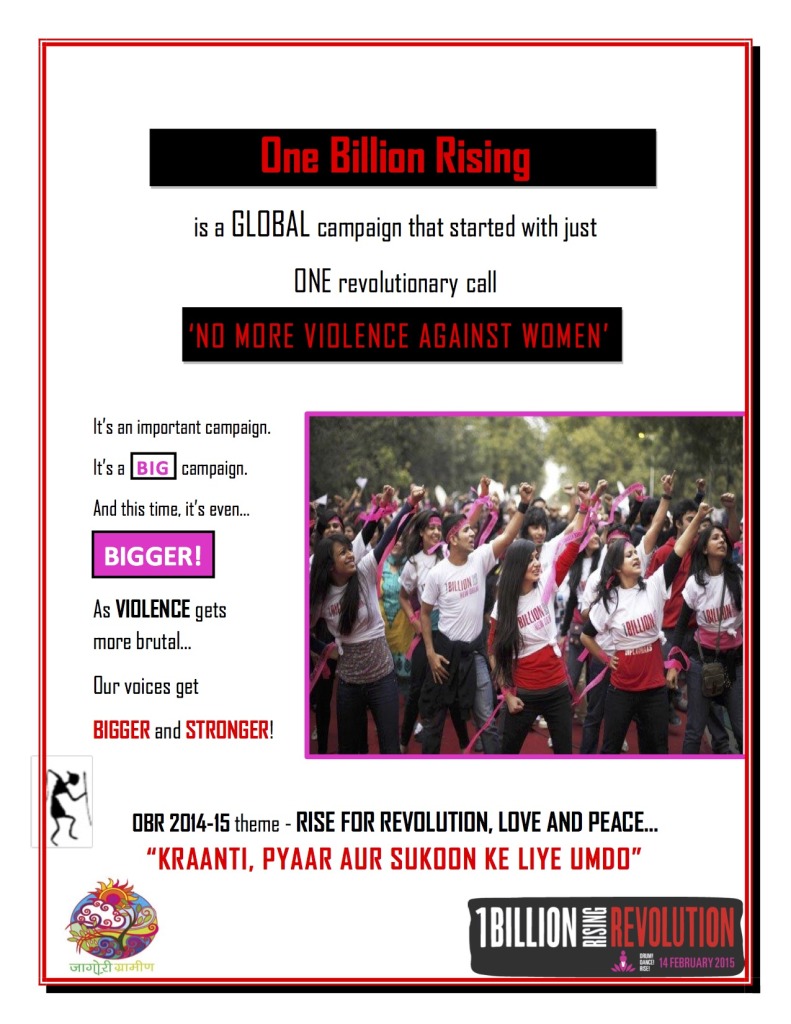 One Billion Rising Revolution activists in India have released this stunning newsletter about their collective events & actions building to Feb 2015. The report is full of photos, revolutionary ideas, artistic expressions of love & anti-violence, and inspiration!
One Billion Rising Revolution activists in India have released this stunning newsletter about their collective events & actions building to Feb 2015. The report is full of photos, revolutionary ideas, artistic expressions of love & anti-violence, and inspiration!
It’s the perfect read if you’re looking of ways enrich and expand your #Rise4Revolution
VIEW India’s Official One Billion Rising Newsletter 2014 – 2015! >
Posted — Filed under
V-Day
Tagged — No Comments
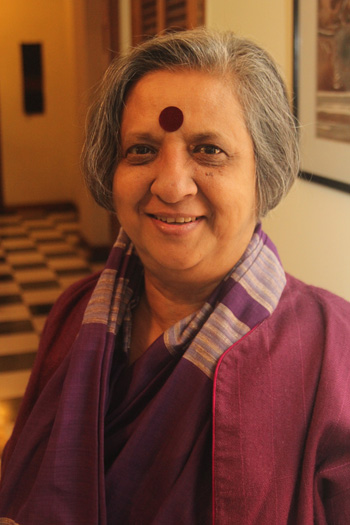 When did I become a feminist? There are lots of moments in every woman’s life that make her stand up for herself and her sisters, and there were many in mine. But the first one that comes to mind is the day I was told I couldn’t take a seat on the bus, simply because I was a woman.
When did I become a feminist? There are lots of moments in every woman’s life that make her stand up for herself and her sisters, and there were many in mine. But the first one that comes to mind is the day I was told I couldn’t take a seat on the bus, simply because I was a woman.
I grew up in East Pakistan – now Bangladesh – in the 1950s and 1960s. It was a country where women were raised to see their lives as leading up to marriage. Especially in the countryside, that meant you were totally obedient to your husband inside the home, and totally silent outside it. After I finished my formal education, I watched as my friends were pressured to find a husband. I was from an unusual and wonderful family where my parents wanted me to be free and to choose my own path, and they always treated me as the equal of any man. I knew I was in a privileged position, so I wanted to understand what life was like across my country for women who weren’t so lucky. That’s why, in the aftermath of our War of Independence in 1971, with much of the country in ruins, I went to work for an aid agency. After two years of working in Dhaka, I felt I needed to work in the field so I told them to send me to their most remote field areas, where the need was greatest.
My boss was very unsure of sending a very city-bred, single, young woman to live and work in the villages. “You have never been to a village before.” Well, I said, there is a first time for everything. Then his real concern came out: no woman would be accepted as a figure of authority. Well, I replied, not if we don’t start somewhere. He tried to give reasons why I couldn’t go – like the impracticality of me living there. He said there was no separate room for me to stay, because there were no other women working either in the aid agency or anywhere in this remote area. There were no proper toilets. “Do you,” I asked, “have a private room when you go there?” He admitted he did. “Then I will take your room,” I said.
I began my travels in the third class compartment on the train, on river launches and in overcrowded buses. Women’s compartments were separate on launches and trains, and we were jammed into tiny airless compartments, crammed tightly, with the windows kept shut and covered up so nobody would accidentally glimpse them. On the bus, there were only two rows, with six seats, for women. It was unbearably hot. In that tiny space, women had to carry their children and often their chickens, sometimes even goats, crammed with them. They would only ever travel from one home to another – their father’s home to their husband’s home. The women were required and forced into being submissive and meek. I would sit in the men’s compartment, which was more open and had more space.
I got the bus for my next stage of the journey, and I was often told I had to buy two tickets, because no man would sit next to me. “That’s their problem, not mine,” I said. Other times, the bus conductor would say there was no seat for a woman. I looked down the bus and saw plenty of seats – but they were next to men, so he would refuse to let me sit. I barged and took my seat anyway. People would look astonished. They could hear from my voice that I was from the city, and educated – if I had been a rural woman behaving this way, it would be very nasty.
When the conductor came down the bus to collect tickets, he would not speak to or address the women in any way. He would say loudly: “Who does this woman belong to?” Later, I would travel with my male colleagues, and whenever anyone said this, I would say loudly: “This woman belongs to no man. You see those men at the back? They belong to me.” Years later, I would read about Rosa Parks, and I would understand why she took her seat, no matter what happened.
The village that I first went to and lived in was like a tiny island – for much of the year, during the flooding, it was cut off, and it could only be reached by row-boat. During winter, which is our dry season, it was a 10 mile walk to the nearest launch, and the a five hour ride to the bus and then the train. It was very remote, but that is where I spent some of the most wonderful years of my life and where I learned about people, societal pressures and became what I am today.
Initially, our task in the villages was to help with reconstruction. The Pakistani army had burned their way through villages and destroyed everything in their path, plundering, raping women and killing hundreds and thousands. The boats were ruined, the housing was ruined, the fishing nets were ruined. For desperately poor people, the prospects were catastrophic. Most of them owned no land. I thought at first it was our job simply to replace these goods – to hand out alternatives. But as I lived in a very remote rural village called Anandapur in Sylhet for four years, I began to see that what was needed was not outsiders handing out goods, but for the people in the village to be empowered to demand what they needed for themselves – especially the women.
I would go and sit with the women in their homes, and they would tell me about the domestic violence and sexual abuse they were facing. At first, it seemed many of them had accepted this despairingly as their fate: they didn’t see an alternative. I noticed that often, women who insisted on having a mind of their own – who wanted to write songs or poems, or insisted on speaking out – could go through a terrible pattern. They would be labeled as mad – indeed, many would have breakdowns and act erratically – and it would be announced that they had been possessed by demons. An exorcist would then be called.
The exorcist would burn chillis directly under her nose, to drive the ‘demons’ out. I don’t know if you have ever had a chilli burned close to you, but it is agony – it burns your eyes and nose. If that didn’t work, he would break her finger, or subject her to choking smoke, until she ‘admitted’ the ‘demons’ had left her, and that she would ‘behave.’ This is one of the many methods that was used to force women to be totally submissive.
I was also struck that women were not allowed to own property if she was a Hindu or control and manage her property if she was a Muslim. In Bangladesh, personal laws are governed by the religion you profess or have been born into. According to Hindu practice, women have no right of inheritance, whereas amongst Muslims you inherit half of what your male counterpart gets. If a young Hindu woman was widowed and there were many in the village I first lived in having been killed as a part of genocide during the war, she was not allowed to remarry, and she was not allowed to own her house nor go back to her parents home. She was trapped.
Women could receive no accountability from the men, and the men – who were poor – could receive no accountability from the extremely corrupt authorities. I believed the solution was to organize both groups to defend their rights. I began to help local people to set up co-operatives – and to organize forums where women could talk about their grievances. I wanted to change the situation where you would not hear women’s voices.
The men insisted they did all the work and women had no economic role, but it turned out women did an extraordinary amount. The men would get ‘paddy’ from the fields, which is unprocessed rice, and the women would then be the one that decided which seeds to keep, husk the rice, keep the straw, and do what was necessary to get it to market. I asked the men – how much is raw paddy worth? They would say 100 Taka. And after the women have worked on it, how much is it worth? They would say 200 Taka. So, I explained, the women add half the value: they deserve half of the control. Women were also responsible for growing vegetables, keeping cattle, poultry, and daily repair and maintenance of their homes. But of course, none of this was ever valued.
I began to talk to the men about their daughters, and their hopes for their daughters. I found that was one of the moments when they began to think, and listen. A lot of these men had simply never thought about it – it had never occurred to them that this gender segregation wasn’t just something handed down by nature. It wasn’t something natural, I explained. It could change.
In the forty years since I first went to the villages, I have seen a revolution take place. This process – of women organizing, of uniting with other women, of speaking out – has been happening all over the country. Now, protests are often led by women, whose voices are some of the most articulate and powerful in the country. For example, I was recently in a village where a group of corrupt businessmen have bribed the authorities to seize a large part of the water supply to build a private fishery. A local woman took charge of the fight against this corruption. She organized the men and the women and took charge. Somebody asked her – what about your husband? “He’s at home,” she replied. “I have my own shop. I make my own living. I don’t depend on him. He depends on me.”
All over the country, women are at the forefront of resisting corrupt land-grabs and all other forms of abuse all over the country. I see women routinely challenging conservative imams. Recently, we began work in another village, and representatives of an extreme Islamist group tried to drive us out. The local women – who were poor and landless, they didn’t even have sandals – stood in front of our offices and said to a mob of fundamentalists: “We are the women of this village, and these people are our guests. You have no right to interfere, and you will not get past us.” The young men and there were over a hundred men from a militant group, confronted by so many village women standing strong, were totally shocked – and then they left.
Now, if a woman is a victim of domestic violence, the other women will rally to her, and get her medical help, and legal assistance, and they will shun the man who attacked her. I have seen this happen with so many women – the discovery that they don’t have to be beaten; that they can be stronger than their attackers.
And it goes even deeper. I have seen the attitudes of men change. When I first went to the villages and suggested men share the housework with their wives, people laughed in my face, they laughed at the men who attempted to share housework. Today, it is spreading across the country, and some men talk about sharing with pride. Women aren’t forced to put up with being attacked at home like they used to. They have hope. When I hear how they speak now – it is amazing to me. It makes me think that anything is possible.
It’s very easy to stand outside a situation and say ‘I will do this for you.’ I have tried to work differently – to stand alongside people and say: how can I work with you? If you are beaten up, if you are intimidated, if you are afraid, I’ll stand with you.
For me, that’s what One Billion Rising has been all about. Women are engaged in this fight all over the world. Every February 14th, we come together to resist the violence against women that is happening to women all over the world. In Bangladesh, we had around 400,000 women and men who came forward and rose and danced in our streets, in villages and cities, held rallies, human chains, sign petitions, for freedom for women from violence and sexual abuse. I looked across during our rising in Dhaka, our main city, and I saw all kinds of women, women in saris, women in pants, women in hijabs, all dancing as one.
None of these women are ever going to be told they can’t have a seat on the bus because they are a woman – not ever again. I’ll dance to that.
As told to the One Billion Rising team
Khushi Kabir is the Global Coordinator for One Billion Rising Bangladesh.
1 in 3 women across the planet will be beaten or raped during her lifetime. That’s ONE BILLION WOMEN AND GIRLS. Every February, we rise – in hundreds of countries across the world – to show our local communities and the world what one billion looks like and shine a light on the rampant impunity and injustice that survivors most often face. We rise through dance to express joy and community and and celebrate the fact that we have not been defeated by this violence. We rise to show we are determined to create a new kind of consciousness – one where violence will be resisted until it is unthinkable.
This year we are rising for Revolution. We are initiating a new series, “Building to One Billion Rising Revolution,” where we will be sharing stories of extraordinary activists who embody the creative radical shift in consciousness required to bring about CHANGE.
Grassroots Activists who fight for justice and liberation with passion and joy.
Send us your stories. Stories change everything.
V-Day assumes no liability for any statements made by you on this page or that you otherwise submit to V-Day. Please remember that your post is public. Do not post real names, including your own, in association with your story.
Posted — Filed under
V-Day
Tagged — No Comments
Tickets are NOW ON SALE for the one-night-only Artistic Uprising at the Hammerstein Ballroom in NYC!
ARTISTIC UPRISING
Saturday, 7 February, 7PM
HAMMERSTEIN BALLROOM, NYC
An Evening of Revolutionary Poets, Singers, Dancers & Activists:
MAYA AZUCENA | BATALA NYC | BETTY | CLIMBING POETREE
CHRISTINE SCHULER DESCHRYVER | ASALI DEVAN ECCLESIASTES
EVE ENSLER | GINA LORING | EMMA MYLES | KATHY NAJIMY
THANDIE NEWTON | AGNES PAREYIO | SUNNI PATTERSON | STREB
KARABO TSHIKUBE | MONIQUE WILSON | JAHA ZAINABU | ZOYA
& MORE TO BE ANNOUNCED*
*subject to change
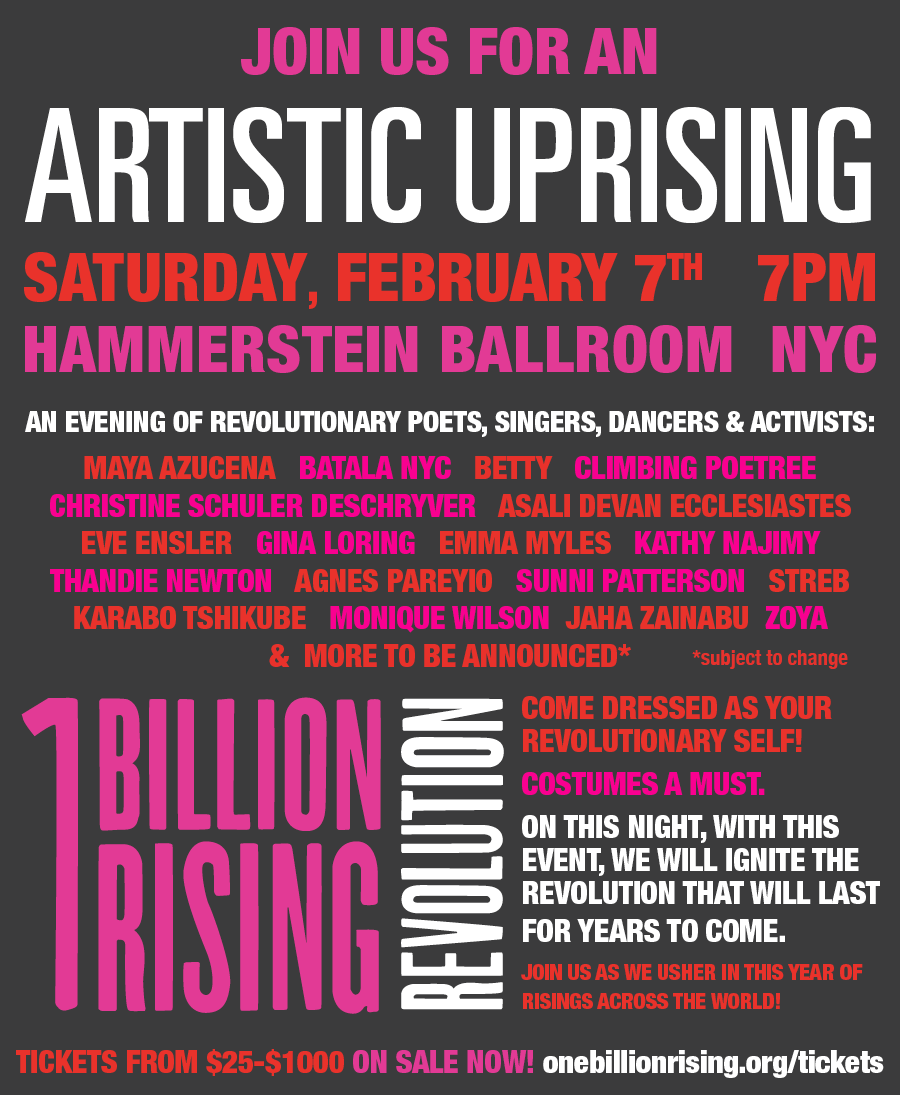 Come dressed as your revolutionary self! COSTUMES A MUST.
Come dressed as your revolutionary self! COSTUMES A MUST.
On this night, with this event, we will ignite the revolution that will last for years to come.
Join us as we usher in this year of risings across the world!
Tickets: $25, $100 (includes One Billion Rising Revolution gift) & $1,000 (includes complimentary wine, champagne and beer for 2 hrs)
ALL TICKETS IN EACH SECTION ARE GENERAL ADMISSION.
All seated tickets are on a first come, first served basis within your chosen section.
BUY TICKETS >
Posted — Filed under
V-Day
Tagged — No Comments
Wishing You LOVE & REVOLUTION in the New Year!
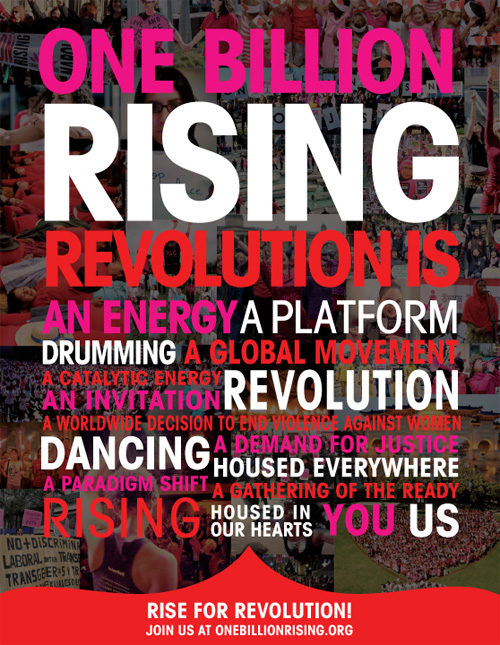
Posted — Filed under
V-Day
Tagged — No Comments
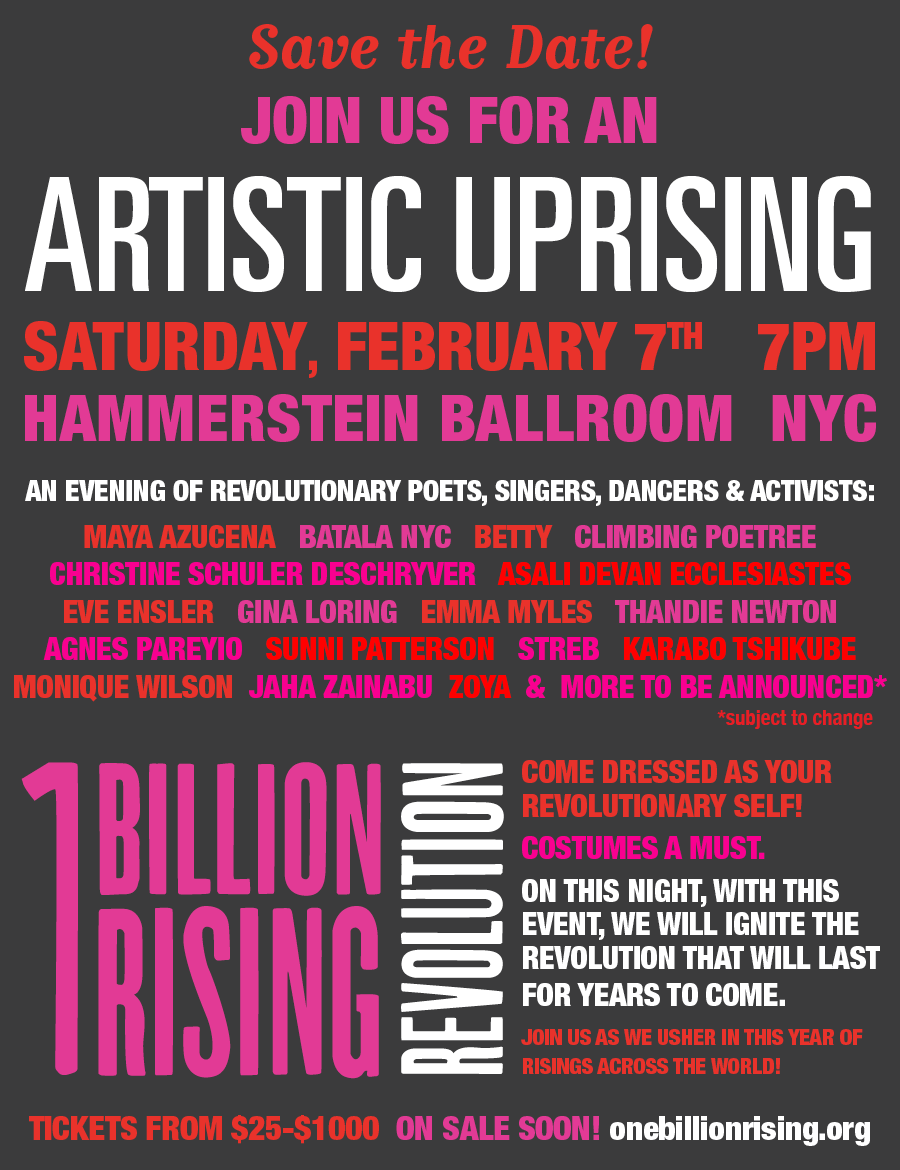 Start the New Year by purchasing your tickets to the ARTISTIC UPRISING event at the Hammerstein ballroom in NYC!
Start the New Year by purchasing your tickets to the ARTISTIC UPRISING event at the Hammerstein ballroom in NYC!
On Sale, Friday, 2 January!
Join us for an an evening of Revolutionary poets, singers, dancers & activists.
LEARN more >
Posted — Filed under
V-Day
Tagged — No Comments
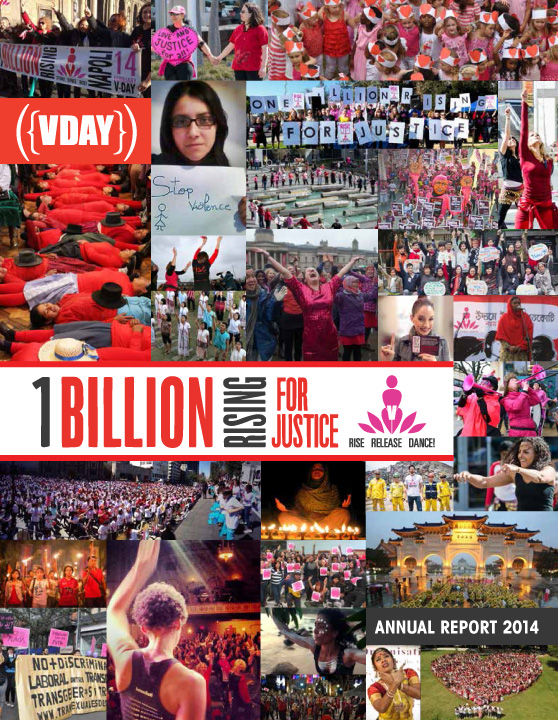 “Every rising was a part of a collective energetic decision to end the violence on this planet…Every rising was a dance of connection to end racial, environmental, economic and gender injustice.” – Eve Ensler, Founder
“Every rising was a part of a collective energetic decision to end the violence on this planet…Every rising was a dance of connection to end racial, environmental, economic and gender injustice.” – Eve Ensler, Founder
2014 was a transformative year for V-Day and One Billion Rising. We stand in awe of what we were able to accomplish as a movement and it is always our pleasure to share the powerful work of bold and outrageous activists. Highlights, video and more available to view online HERE.
31 December is the last day to make charitable donations in order to claim them on your 2014 tax return. 88 cents of every dollar you give goes straight to ending violence against women and girls. DONATE HERE >
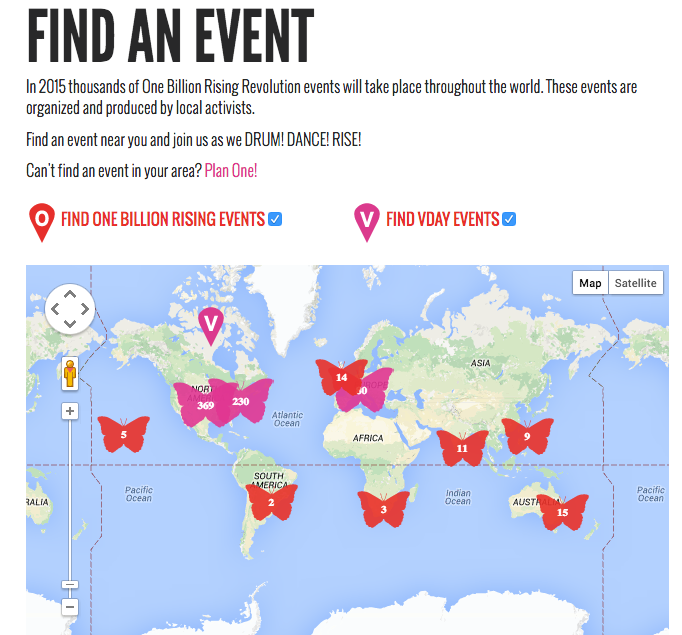 Change can happen if…
Change can happen if…
WE HARNESS OUR CREATIVITY AND ENERGY
Change can happen if…
WE ACT NOW. AND WE ACT TOGETHER.
Sign up for the REVOLUTION in 2015. One Billion Rising will take to streets once again in February.
Find an event near you and join us as we DRUM! DANCE! RISE!
Can’t find an event in your area? Plan One!
Posted — Filed under
V-Day
Tagged — No Comments
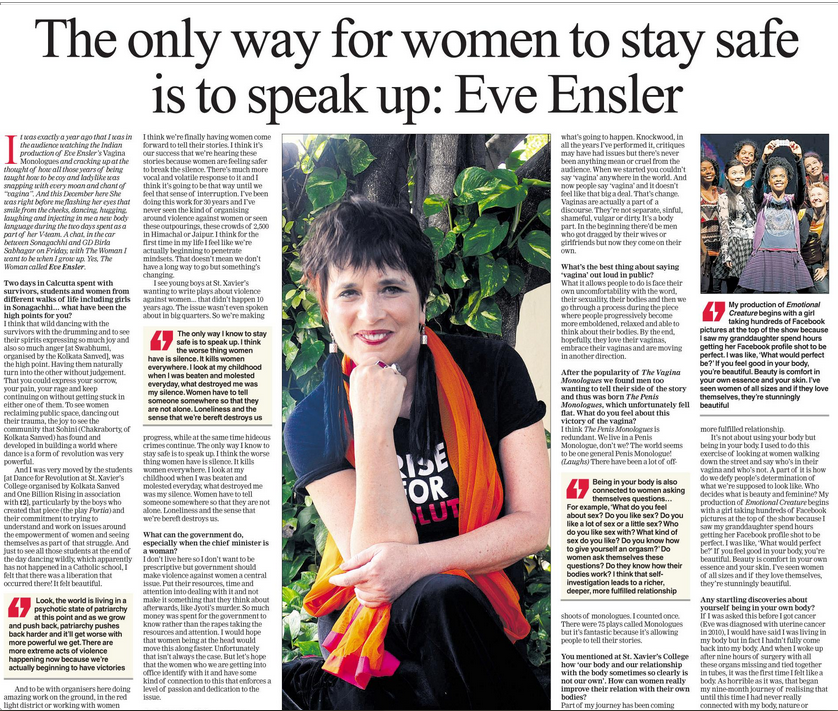 Read the two recent articles reporting on recent OBR Revolution events in Calcutta and the growing grassroots network of activist who are working year-round to end violence locally and across the nation.
Read the two recent articles reporting on recent OBR Revolution events in Calcutta and the growing grassroots network of activist who are working year-round to end violence locally and across the nation.
“The only way for women to stay safe is to speak up: Eve Ensler” >
“Vagina chant – Vagina warrior Eve Ensler was the voice of liberation at Rising for Revolution, presented by Swayam, in association with t2” >
Posted — Filed under
V-Day
Tagged — No Comments

We are pleased to present the latest in the “Building to One Billion Rising REVOLUTION” series.
This week we hear from One Billion Rising Global Coordinator and Family Specialist at Adelante Program in New Mexico Jessica Eva Montoya, and Sohini Chakraborty, Founder and Secretary of Kolkata Sanved Dance Movement Therapy (DMT).
With this series, we share the stories of extraordinary activists who embody the creative radical shift in consciousness required to bring about CHANGE.
What is your story? SEND US YOUR STORY. Stories change everything.
How I Finally Confronted My Abuser, and Found Peace
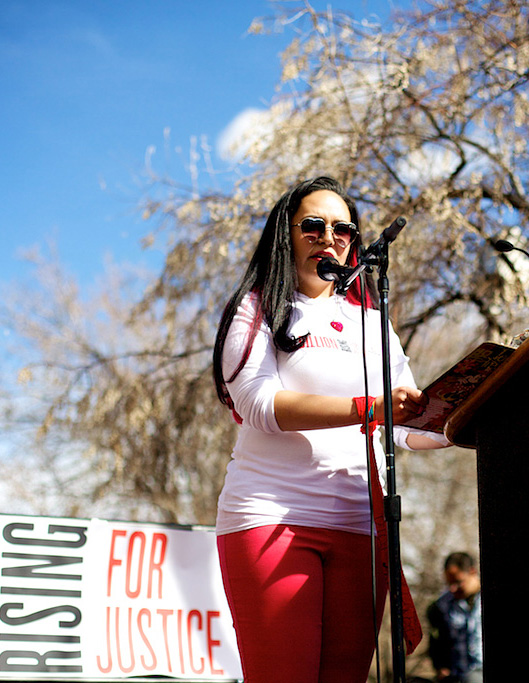 By Jessica Montoya
By Jessica Montoya
Two years ago, I stood in front of a crowd of thousands of people at the One Billion Rising in Santa Fe, and I told my story. The air was crisp and clean and I felt I didn’t need to eat, or drink — there was enough to nourish me right there, in that crowd of women and men who were preparing to dance. For so long, I had been ashamed of what I had been through. Now I could talk about it, and I had all these people cheering me.
CONTINUE reading >
There’s a Force that Can Heal Trauma, and it’s Not What You Think
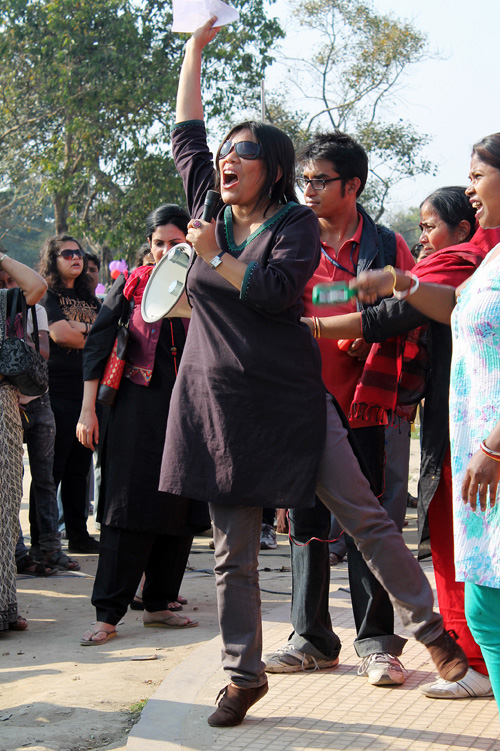 By Sohini Chakraborty
By Sohini Chakraborty
Dance can set you free. It can liberate your body and liberate your mind. That is what I have learned in my own life and that is the lesson I remember while working with women who have been taught through violence to see their bodies as disgusting, shameful, or ruined. Every day I see dance undoing this shame and setting individuals free.
CONTINUE reading >
 If you saw me in the street, you might recognize me, but I guess you wouldn’t know where from. I’m the person who served up your Happy Meal in McDonald’s. A few years later, I waited on your table at Red Lobster. A few years after that, I brought over your barbeque ribs at Dallas BBQ. Whenever I talk to customers like you, I smile as big as I can, and I say that I hope you have a nice day. I mean it too. But I figure I am writing this to tell you something I wouldn’t tell you over the counter. I want to tell you what life is like for people like me right now – because I am not having a nice day, and if I’m honest, I haven’t been for a really long time now.
If you saw me in the street, you might recognize me, but I guess you wouldn’t know where from. I’m the person who served up your Happy Meal in McDonald’s. A few years later, I waited on your table at Red Lobster. A few years after that, I brought over your barbeque ribs at Dallas BBQ. Whenever I talk to customers like you, I smile as big as I can, and I say that I hope you have a nice day. I mean it too. But I figure I am writing this to tell you something I wouldn’t tell you over the counter. I want to tell you what life is like for people like me right now – because I am not having a nice day, and if I’m honest, I haven’t been for a really long time now.

 When did I become a feminist? There are lots of moments in every woman’s life that make her stand up for herself and her sisters, and there were many in mine. But the first one that comes to mind is the day I was told I couldn’t take a seat on the bus, simply because I was a woman.
When did I become a feminist? There are lots of moments in every woman’s life that make her stand up for herself and her sisters, and there were many in mine. But the first one that comes to mind is the day I was told I couldn’t take a seat on the bus, simply because I was a woman.







